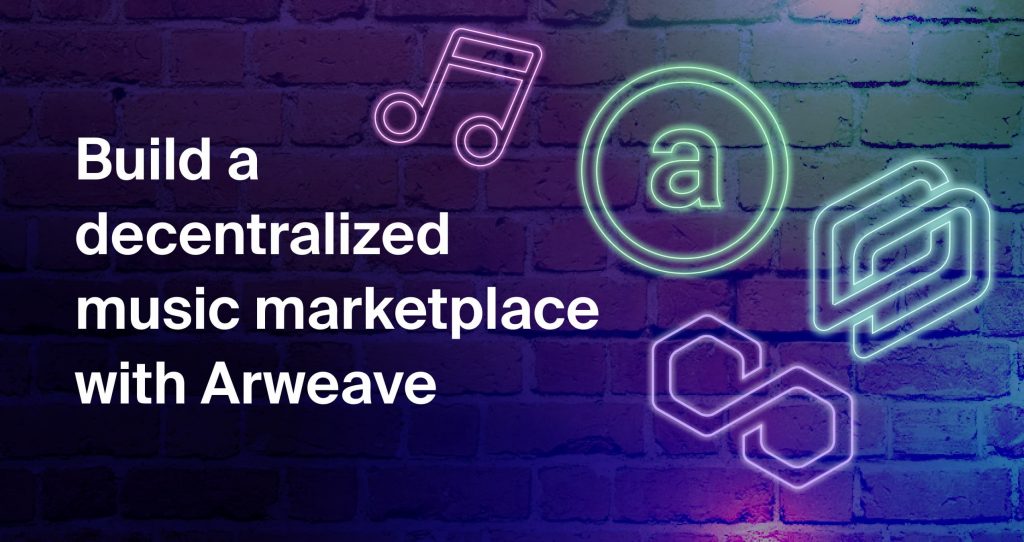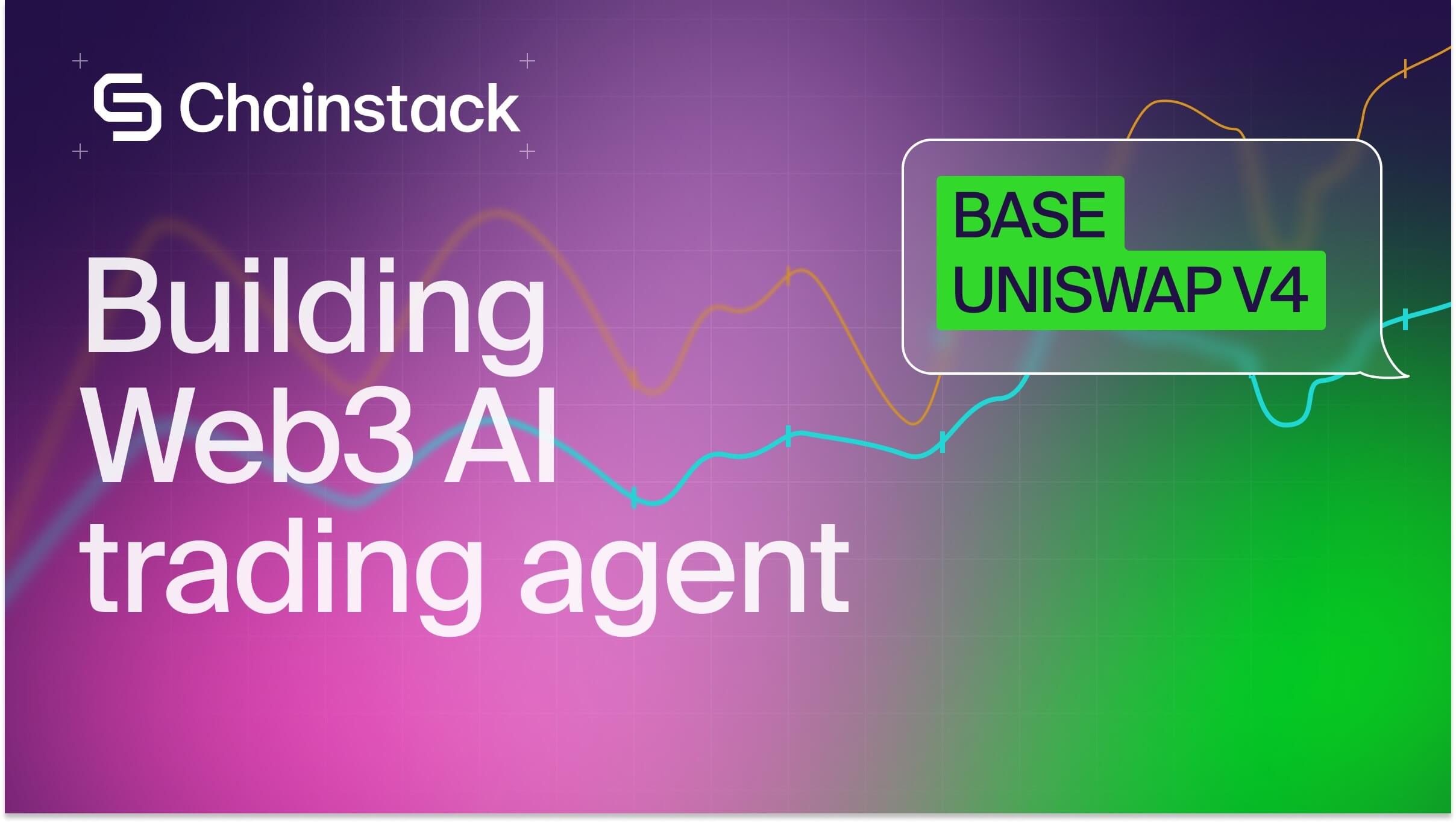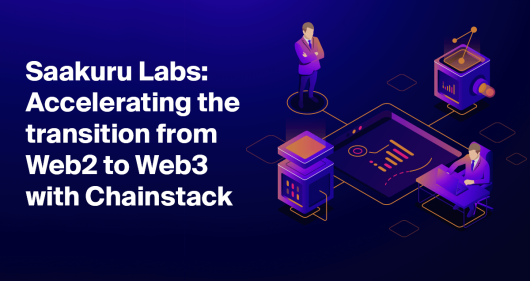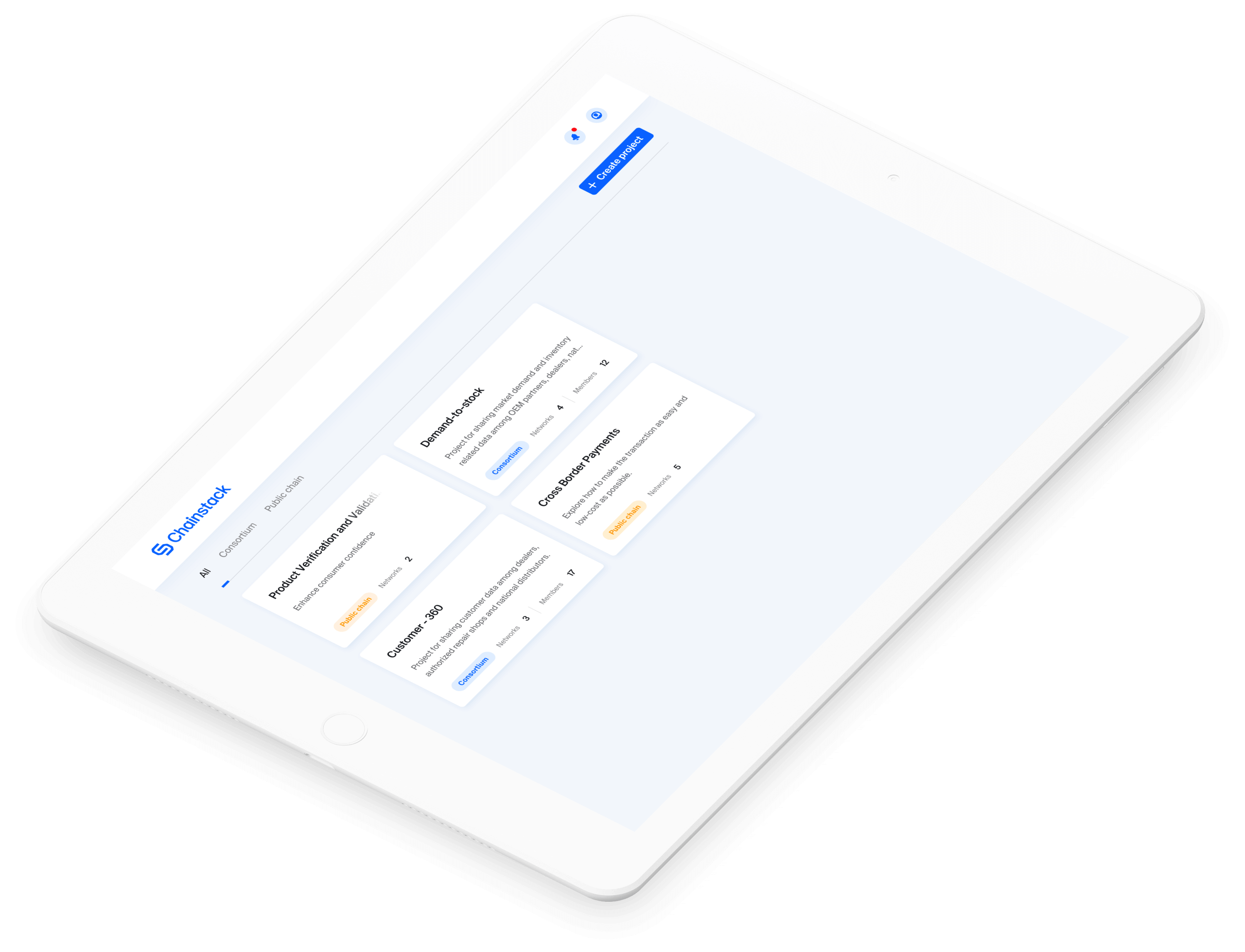Building a decentralized music marketplace with Arweave, Bundlr, and Polygon

File storage is one of those systems required in most complex web apps. You’re building an Instagram-clone app? You need a file storage system for the photos. A Youtube-like app? You need it for that as well.
Almost any web2 app has a file storage system behind it. And all those applications use services like AWS S3 or Cloudinary that provide an easy way to upload and query files through simple-to-use APIs.
However, these solutions have the same problem as any other web2 app: they’re not decentralized.
In the web3 space, there are multiple projects building decentralized data storage systems like IPFS, Filecoin, and Arweave. In this article, we’ll talk about the latter and explain how to create a decentralized music marketplace that uses Arweave to store song files.
Ready? Let’s get to it 🤘
What is Arweave (in a nutshell)?
Arweave is a decentralized storage network (DSN) and it allows users to upload any type of file and pay a single fee at the time of uploading. This is one of the key differences with other protocols like IPFS, where you have to make repeated payments to keep your files online.
In addition, Arweave stores data permanently, so your files are never deleted from the DSN. This has allowed different use cases, like the “permaweb”. You can use Arweave to host a website and, as the files are stored permanently, it’ll never be censored so your website will always be online.
To upload files you need to pay using the Arweave native token, which you can buy from different exchanges. In this article, we’ll follow a different route using Bundlr. Let’s see how it works.
Using Arweave with other tokens with Bundlr
What is Bundlr network? A protocol built on top of Arweave that aims to solve some of Arweave’s native limitations. Using Bundlr you can upload files to Arweave paying with different tokens like ETH, SOL, MATIC, or AVAX to name a few. This gives users a lot more flexibility and opens up the protocol to users from all these different networks.
In addition, Bundlr uses bundles (😉) to reduce to cost of uploading files, and even makes uploads free for files under 100kb.
And finally, Bundlr network provides its own Javascript library that makes it super easy to interact with the protocol. Piece of cake 🍰
You can learn more about Bundlr in their docs.
Transferring funds to Bundlr
It’s important to mention that in order to upload files to Arweave using Bundlr, you need to transfer funds from your wallet to Bundlr. You can do this in advance using this app (not the greatest design but you can trust it 😉) or you can do it programmatically following this section of the docs.
For the decentralized music marketplace, I decided to follow the lazy-funding approach. That means: check if the user has transferred the funds in advance and, if not (or if the funds are not enough), trigger the funding before actually uploading the file. Don’t worry, we’ll review that in detail later 😉
It’s also worth mentioning that you can withdraw your funds from Bundlr back to your wallet as well.
Decentralized music marketplace overview
To showcase how to use Arweave and Bundlr, we’re going to build a decentralized music marketplace app. Here is how it’ll work:
- Users will be able to upload MP3 files and list them for sale by a price.
- The songs will be uploaded to Arweave via Bundlr and the metadata (title, price, author, and download link) will be stored in a smart contract deployed in Polygon.
- Other users will be able to browse listed songs and buy them by paying with MATIC
- When a user buys a song, the MATIC will be sent to the author and the buyer will get a link to download the song or listen to it.
We’ll limit this app to MP3 files. In addition, the songs will be bought and sold using MATIC only, but you can extend this app to work with other file types and multiple protocols if you want. We’ll give you some ideas at the end of this article 😉
Tech stack
To build this project we’ll use the following tech stack:
- Solidity to write the smart contract.
- Javascript to write smart contract tests and deployment scripts.
- React / Next.js for the web app.
You can find the whole code for this app in the following GitHub repository.
Let’s start coding 👨🏻💻
Smart contract
We need a smart contract to store the song’s metadata: title, price, author, and each song’s URL in Arweave.
As we don’t want all users to be able to see the URL of every song, we’ll separate the metadata into two different mappings, one with the public information (title, price, and author) and another one private with the URL.
// SPDX-License-Identifier: MIT
pragma solidity ^0.8.4;
contract MusicMarketplace {
// Song struct
struct Song {
uint256 id;
uint256 price;
address author;
address[] buyers;
string title;
}
// array that stores all songs
Song[] songs;
// stores all songs URLs
mapping(uint256 => string) private songDownloadURLs;
// events
event SongListed(uint256 indexed id, string title, uint256 price);
event SongSold(uint256 indexed id, address buyer);
//....
}To list a song for sale, users will provide a title, price, and the URL of the file in Arweave. Then we’ll just save that information in the songs and songDownloadURLs state variables as follows:
// save song info to songs array
function listSong(
string memory _title,
uint256 _price,
string memory _arweaveURI
) public {
Song memory song;
song.id = songs.length;
// save price and other info to song struct
song.price = _price;
song.author = msg.sender;
song.title = _title;
// create memory array to store buyers and
// include the author
address[] memory buyers = new address[](1);
buyers[0] = msg.sender;
// save buyers to song struct
song.buyers = buyers;
// save to list of songs
songs.push(song);
// save the file's arweave URI in private mapping
songDownloadURLs[song.id] = _arweaveURI;
emit SongListed(song.id, _title, _price);
}Notice that we’re also saving the owner using the msg.sender variable and that we’re also including it in the buyers array. We’re doing this to make sure an author does not have to buy his/her own songs and to simplify things for our frontend 😉
To buy a song, we’d need a payable function that receives the amount of MATIC and the song id that the user wants to buy. We also need to do a few checks, like making sure the song id provided exists, that the buyer is not the author of the song and that the user has not bought the song already. For that, I created the following modifiers:
// check if song id exists
modifier songExists(uint256 _id) {
require(songs.length >= _id, "The song does not exist");
_;
}
// checks if user is not the author of the song
modifier isNotAuthor(uint256 _id) {
require(
msg.sender != songs[_id].author,
"You are the author of this song"
);
_;
}
// checks if msg.sender is included in buyers list of song _id
modifier isNotBuyer(uint256 _id) {
require(songs[_id].buyers.length > 0, "The song has no buyers");
bool userIsNotBuyer = true;
for (uint256 x = 0; x < songs[_id].buyers.length; x++) {
if (songs[_id].buyers[x] == msg.sender) {
console.log("Found buyer: ", songs[_id].buyers[x]);
userIsNotBuyer = false;
}
}
require(userIsNotBuyer, "You already own this song");
_;
}
Then we can use them in our buySong function. It will check that the amount sent is valid, transfer the funds to the author of the song, and add the user’s wallet address to the buyers array in the song mapping:
function buySong(uint256 _id)
external
payable
songExists(_id)
isNotAuthor(_id)
isNotBuyer(_id)
{
// check if user sent enough funds
require(msg.value >= songs[_id].price, "Not enough funds");
// transfer funds
address payable receiver = payable(songs[_id].author);
(bool sent, ) = receiver.call{value: msg.value}("");
require(sent, "Failed to send Ether");
// add sender to buyers array
songs[_id].buyers.push(msg.sender);
emit SongSold(_id, msg.sender);
}The last important part of this contract is a function to retrieve the URL of the song’s in Arweave. To run this song I created another modifier to make sure that only users that have actually bought the song can retrieve the URL:
// checks if msg.sender is included in buyers list of song _id
modifier isBuyer(uint256 _id) {
require(songs[_id].buyers.length > 0, "The song has no buyers");
bool userIsBuyer = false;
for (uint256 x = 0; x < songs[_id].buyers.length; x++) {
if (songs[_id].buyers[x] == msg.sender) {
console.log("Found buyer: ", songs[_id].buyers[x]);
userIsBuyer = true;
}
}
require(userIsBuyer, "You do not own this song.");
_;
}Then we can use this modifier in the getDownloadLink function, which then will be pretty simple as all the checks are done in the modifiers songExists and isBuyer:
function getDownloadLink(uint256 _id)
public
view
songExists(_id)
isBuyer(_id)
returns (string memory)
{
// return url from state mapping
return songDownloadURLs[_id];
}That covers most of the smart contract code. You can find the full code in this file in the repository and even some tests that you can run locally.
Creating the web app
This build the web app I used Next.js with the create-next-app command. I separated it into three different pages:
- index: a landing page with the button to connect Metamask.
- dashboard: page to upload song files and metadata.
- browse: page to browse available songs and listen to them.
As we’ll access a lot of state variables from multiple pages, like contract and wallet interfaces, so we’d need to define them in the app entry point file _app.js and use a context provider to share them throughout the rest of the pages.
Dependencies
Apart from the default Next.js dependencies, we’ll need to use the Bundlr library to interact with Arweave through Bundlr and TailwindCSS to help style the app.
@bundlr-network/client: library documentationtailwindcss: follow installation guide here
The landing page: connect wallet and fetch balance
The landing page has just a button to connect the user’s wallet that will trigger the initWallet below. As we’ll be using Bundlr to interact with Arweave, we’ll actually initialize a Bundlr instance using the Metamask provider, which is injected in window.ethereum by default:
let provider
// set the base currency as matic
const [currency, setCurrency] = useState('matic')
/**
* Connects user's Metamask, initialise bundlr ineterface,
* contract interface and retrieves balances
*/
async function initWallet() {
// return if Metamask is not installed
if (!window.ethereum) return
await window.ethereum.enable()
// check if current network is ok
const networkOk = await checkNetwork()
if (!networkOk) return
// creates an Ethers provider from Metamask
provider = new providers.Web3Provider(window.ethereum)
await provider._ready()
console.log('Provider Ready! > ', provider)
// load Bundlr endpoint from env or use testnet by default
// Mainnet is: 'https://node1.bundlr.network'
// Testnet is: 'https://testnet1.bundlr.network',
const bundlrEndpoint =
process.env.NEXT_PUBLIC_BUNDLR_ENDPOINT || 'https://testnet1.bundlr.network'
// initialise Bundlr wallet instance using the same provider
const bundlr = new WebBundlr(bundlrEndpoint, currency, provider)
await bundlr.ready()
console.log('Bundlr provider ready')
// saves Bundlr instance in app state
setBundlrInstance(bundlr)
bundlrRef.current = bundlr
//
await initContractInterface()
// retrieves balance from Bundlr
await fetchBalance()
// redirect to browse page
router.push('/browse')
}With the fetchBalance function we will retrieve both the Metamask balance and the Bundlr balance so we can check if the user has enough funds to upload a song. Remember that we have to transfer funds to Bundlr to actually use it.
// state variables to save balance
const [bundlrBalance, setbundlrBalance] = useState(0)
const [balance, setBalance] = useState(0)
// Retrieve the user's metamask and bundlr balances
async function fetchBalance() {
// gets balance from Bundlr instance initialised earlier
const bal = await bundlrRef.current.getLoadedBalance()
console.log('Bundlr balance: ', utils.formatEther(bal.toString()))
// parse balance to ETH format and save it in app state
setbundlrBalance(utils.formatEther(bal.toString()))
// retrieve balance from Metamask
const balance = await provider.getBalance(bundlrRef.current.address)
console.log('Metamask balance : ', utils.formatEther(balance.toString()))
// parse balance to ETH format and save it in app state
setBalance(utils.formatEther(balance.toString()))
}Dashboard page: uploading songs and listing them for sale
To list a song for sale, users will need to send two transactions:
- First, upload the song file to Arweave through Bundlr.
- After that, save the song title and price in our smart contract.
That means our page will have two different forms. For that, I separated them into two different components, ArweaveUpload.js and SongMetadataForm.js.
The ArweaveUpload component has a simple file input which I styled a little bit with TailwindCSS classes and a button that actually uploads the file. When the user selects a file to upload, the application automatically checks the cost of uploading it to Arweave with the following method:
/**
* Check cost to upload file to Arweave via Bundlr
*/
async function checkUploadCost(bytes) {
if (bytes) {
const cost = await bundlrInstance.getPrice(bytes)
console.log('cost is:', cost.toString())
setFileCost(utils.formatEther(cost.toString()))
if (cost.isGreaterThan(bundlrBalance)) {
console.log('not enough balance')
} else {
console.log('enough balance')
}
}
}Once the user knows the upload cost, he/she can click the upload button which will trigger the following uploadFile function:
/**
* upload the file to Arweave using bundlrInstace from
* global state
*/
async function uploadFile() {
setIsLoading(true)
if (!file) return
const tags = [
{ name: 'Content-Type', value: 'audio/mpeg3' },
{ name: 'App-Name', value: APP_NAME },
]
try {
if (bundlrBalance < fileCost) {
console.log('Insufficient funds in Bundlr, funding...')
await fundBundlr(fileCost)
}
let tx = await bundlrInstance.uploader.upload(file, tags)
setURI(`http://arweave.net/${tx.data.id}`)
setFileUploaded(true)
setIsLoading(false)
} catch (err) {
console.log('Error uploading file: ', err)
setIsLoading(false)
}
}
/**
* transfers funds from the user's Metamask wallet to
* his/her correspondent Bundlr account using bundlrInstance
* from global state
*/
async function fundBundlr(amount) {
try {
console.log('funding bundlr with: ', amount)
const res = await bundlrInstance.fund(parseInt(amount))
console.log('fund response: ', res)
} catch (error) {
console.error(error)
}
}Notice that I’m checking if the Bundlr balance is enough to cover the upload cost and, if not, call the fundBundlr function that will send an additional transaction to transfer funds from the user’s Metamask wallet to their correspondent Bundlr account.
Once the upload transaction is settled, I’m saving the songs URI in the application global state using the default Arweave domain (http://arweave.net/) and the id returned by the upload transaction.
You can find all the code for the ArweaveUpload component in the following file in GiHub.
Once the song is uploaded to Arweave, the next step is to list it for sale by uploading the title, price, and Arweave URL to our smart contract.
For that, I created a separate component named SongMetadataForm. It just contains two inputs for the title and sale price and a button that triggers the saveFileMetadata function:
/**
* saves the song metadata to Smart Contract using
* contract instance and URI from global state
*/
async function saveFileMetadata() {
try {
if (!URI || !title || !sellPrice) return
setIsLoading(true)
console.log(
`Listing song ${title} for ${utils.parseUnits(
sellPrice,
18
)} and URI ${URI}`
)
// save info in contract
const tx = await contract.listSong(
title,
// parses price to ETH format
utils.parseUnits(sellPrice, 18),
URI
)
// wait for transaction to settle
const res = await tx.wait()
console.log('res', res)
// reset everything in form
setTitle('')
setSellPrice('')
setURI('')
setFileUploaded(false)
setIsLoading(false)
// update global state
setMetadataSaved(true)
// refresh list of songs listed for sale
const files = await contract.getSongs()
// redirect to browse page
Router.push('/browse')
} catch (err) {
console.log('Error saving metadata: ', err)
setIsLoading(false)
}
}This will request the user to sign another transaction and, once settled redirect the user to the browse page. As you can see we’re also refreshing the list of songs in the global state by calling the contract.getSongs() method.
Browse page: buying and listening to songs
The next step is to create a browse page in which users will be able to buy songs and listen/download them. So the first thing we need is a function to retrieve all the songs listed for sale from our smart contract. It’ll look like this:
export default function Browse() {
const {
bundlrInstance,
songs,
getSongs,
} = useContext(MainContext)
// when app loads, fetch songs
useEffect(() => {
if (!bundlrInstance) Router.push('/')
getSongs()
}, [])
/**
* fetchs songs listed for sale from the app smart contract
*/
async function getSongs() {
try {
console.log('Retrieving songs')
const songs = await contractGetter.getSongs()
setSongs(songs)
} catch (error) {
console.error('ERROR GETTING FILE LIST: ', error)
}
}
return (
// Render list of songs
<div className="container mx-auto grid md:grid-cols-3 gap-4 mt-12">
{songs.length > 0 && songs.map((s) => <Song song={s} key={s} />)}
</div>
)As we’re calling this function from both the browse and the dashboard pages, I actually declared it in the app entry file (_app.js) and pass it down using a MainContext Provider 😉
To render each song I created a separate component named just Song.js. In it, I’m displaying the song’s title, price, the number of buyers, and a dynamic button that allows users to buy the song or, if they’ve already done it (or if they’re the author), listen to it. Here is the code:
import { utils } from 'ethers'
import { useContext, useState, useEffect } from 'react'
import { MainContext } from '../globalContext'
export default function Song({ song }) {
const {
contract,
address,
getSongs,
setAppMessage,
setShowAppMessage,
setAppMessageIsError,
} = useContext(MainContext)
// tries to retrieve song URL on load
useEffect(() => {
getSongURL()
}, [])
const [isLoading, setIsLoading] = useState(false)
const [songURL, setSongURL] = useState('')
const [canPlay, setCanPlay] = useState(false)
/**
* Retrieves songURL from Arweave. Only author/buyers can
* call this method of the smart contract
*/
async function getSongURL() {
try {
const songURL = await contract.getDownloadLink(song.id)
console.log('songURL', songURL)
setSongURL(songURL)
await getSongs()
userCanPlay()
} catch (e) {
console.log('Error retrieving song URL >> ', e)
}
}
function accShort() {
return `${song.author.slice(0, 2)}...${song.author.slice(-4)}`
}
/**
* Check if user is author or one of the buyers
*/
function userCanPlay() {
console.log('Checking if songs buyers include ', address)
console.log('song.buyers: ', song.buyers)
console.log('user address ', address)
if (song.buyers.includes(address) || song.author == address) {
console.log('Buyer / author found!')
setCanPlay(true)
} else {
setCanPlay(false)
}
}
/**
* Buys song for user using the contract interface
* from app global state
*/
async function buySong() {
try {
setIsLoading(true)
console.log(`Buying file ${song.id.toString()}`)
// trigger buySong method from smart contract
const tx = await contract.buySong(song.id.toString(), {
value: song.price,
})
const res = await tx.wait()
console.log('Transaction completed')
setAppMessage('Song bought! You can listen it now 🎧🎶')
setShowAppMessage(true)
setAppMessageIsError(false)
// refresh state to change play/buy button
await getSongs()
console.log('Songs refreshed')
userCanPlay()
setIsLoading(false)
} catch (err) {
console.error(err)
setAppMessage('Error buying song 🤕')
setShowAppMessage(true)
setAppMessageIsError(true)
setIsLoading(false)
}
}
return (
<div className="p-4 border border-blue-100 hover:shadow-xl mb-4 rounded-lg flex flex-col space-y-4">
<div className="">
<h4 className="text-xl font-medium">
<span className="text-base">{song.id.toString()}</span> | {song.title}
</h4>
<p className="text-sm my-4">by {accShort()}</p>
<p className="text-sm font-medium">
Price: {utils.formatEther(song.price)}
</p>
</div>
{canPlay ? (
<a
className="w-auto px-4 py-2 border border-transparent text-sm font-medium rounded-md text-blue-700 bg-blue-100 hover:bg-blue-200 focus:outline-none focus:ring-2 focus:ring-offset-2 focus:ring-blue-500"
href={songURL}
target="_blank"
>
Listen song
</a>
) : (
<button
className="w-auto px-4 py-2 border border-transparent text-sm font-medium rounded-md text-orange-700 bg-orange-100 hover:bg-orange-200 focus:outline-none focus:ring-2 focus:ring-offset-2 focus:ring-orange-500"
onClick={buySong}
>
{isLoading ? 'In progress...' : 'Buy song'}
</button>
)}
<p className="text-sm my-4">{song.buyers.length} buyers</p>
</div>
)
}And with that, we have our decentralized music marketplace ready. You can give it a try here.
What’s next?
This app covers the basics of how to interact with Arweave using Bundlr but there are many things that you can do to extend this app. Here are a few ideas:
- Improve the music player.
- Make the site a permaweb by deploying it to Arweave using arkb.
- Add a section in the dashboard with all the songs a user has uploaded.
- Extend the accepted currencies to stablecoins in Polygon.
- Deploy the contract to different blockchains like Avalanche or BNB Smart Chain and accept different cryptocurrencies.
Remember that you can find the full code of this app in the following repository on GitHub, so feel free to fork it, use it for your own project, or create a PR to improve it!
Power-boost your project on Chainstack
- Discover how you can save thousands in infra costs every month with our unbeatable pricing on the most complete Web3 development platform.
- Input your workload and see how affordable Chainstack is compared to other RPC providers.
- Connect to Ethereum, Solana, BNB Smart Chain, Polygon, Arbitrum, Base, Optimism, Avalanche, TON, Ronin, zkSync Era, Starknet, Scroll, Aptos, Fantom, Cronos, Gnosis Chain, Klaytn, Moonbeam, Celo, Aurora, Oasis Sapphire, Polygon zkEVM, Bitcoin and Harmony mainnet or testnets through an interface designed to help you get the job done.
- To learn more about Chainstack, visit our Developer Portal or join our Discord server and Telegram group.
- Are you in need of testnet tokens? Request some from our faucets. Multi-chain faucet, Sepolia faucet, Holesky faucet, BNB faucet, zkSync faucet, Scroll faucet.
Have you already explored what you can achieve with Chainstack? Get started for free today.
 Ethereum
Ethereum Solana
Solana TON
TON Base
Base BNB Smart Chain
BNB Smart Chain Sui
Sui Unichain
Unichain Aptos
Aptos TRON
TRON Ronin
Ronin zkSync Era
zkSync Era Sonic
Sonic Polygon
Polygon Gnosis Chain
Gnosis Chain Scroll
Scroll Avalanche Subnets
Avalanche Subnets Polygon CDK
Polygon CDK Starknet Appchains
Starknet Appchains zkSync Hyperchains
zkSync Hyperchains



























